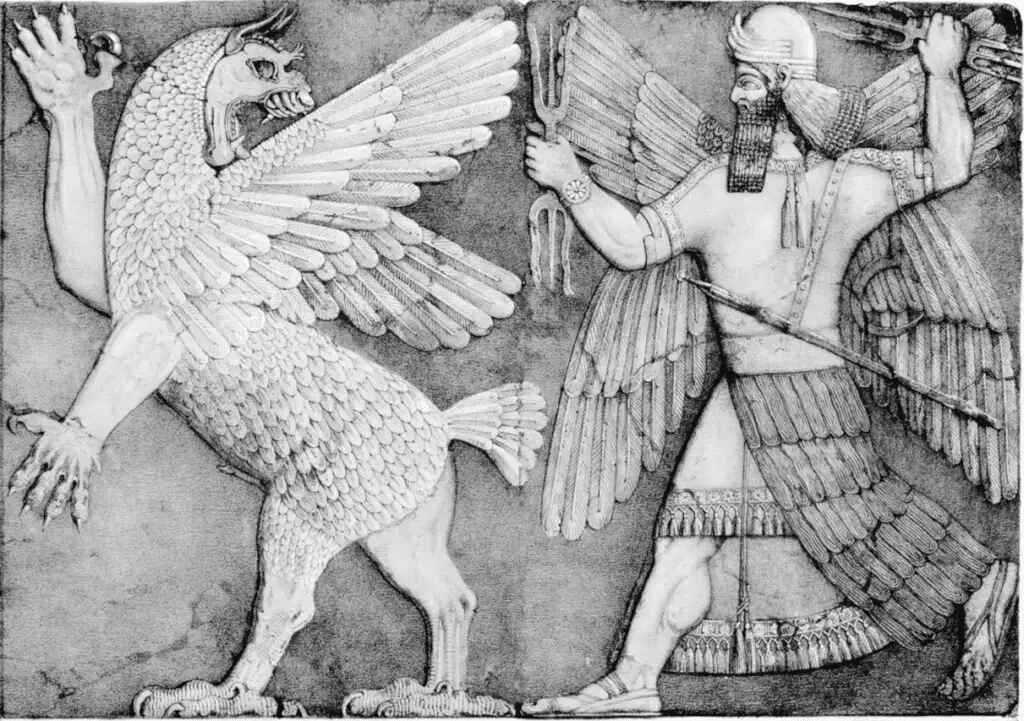The Enduring Tale of Creation: From Tiamat and Marduk to Google and Apple
Let’s examine the first recorded creation story, which dates back to 1700 or 1900 BC. In this Mesopotamian creation story from the Enuma Elish, Apsu (freshwater) and Tiamat (saltwater) mingled, giving birth to the first generation of gods. Apsu, disturbed by the gods’ noise, planned to destroy them, but Ea (Enki) put Apsu to sleep and killed him. Tiamat, angered by Apsu’s death, created an army of monsters led by her consort, Kingu. The gods turned to Marduk for help. Marduk defeated Tiamat, split her body to form the heavens and earth, and became the supreme god.
After Marduk defeated Tiamat and became the supreme god, the gods decided to create humans to serve them. They wanted the newly created beings to carry out tasks and work on their behalf, so the gods could enjoy a more leisurely existence.
To create the first humans, the gods used the blood of Kingu, Tiamat’s slain consort, and mixed it with clay. This union of divine and earthly elements symbolized the connection between the gods and humanity. The god Ea (Enki) was instrumental in this creation process, being the god of wisdom and creation.
Once humans were created, they were tasked with various responsibilities. These duties included tending to the land, building temples, offering sacrifices, and providing the gods with sustenance through prayer and worship. In essence, humans were created as a workforce to maintain the gods’ world and ensure their comfort and happiness.
This belief in humans serving the gods is a common theme in ancient Mesopotamian religion, where the people’s primary purpose was to honor and appease the gods. This way of life led to the establishment of complex religious practices, rituals, and societal structures centered around the gods’ worship and service.
Apsu + Tiamat = First Generation of gods
First Generation of gods + Mating = Second Generation of gods
Tiamat vs Marduk (great-grandson) = Marduk wins
Tiamat’s Body = Heavens and Earth formed from it
Humans = Created to serve the gods
Fast forward to current times; we no longer have the chief deity, but we do have people at the top, such as CEOs, who say they don’t want to do certain work and need others to do it for them. In response, “zombies” are created to sit at desks from 9 to 5, crunch numbers, and work all day long in servitude. They are given a piece of paper at the end of the week or month as compensation, and they are grateful for it.
In the new era, we have new gods that demand our attention and allegiance. The ancient Babylonian story of Apsu, Tiamat, Marduk, and the creation of a second generation of deities, along with the origin of demons and the need for subservient creatures to serve and worship them, may no longer hold relevance today. Instead, we find ourselves increasingly beholden to powerful entities such as Facebook, Google, Apple, and other major corporations and their cronies.
It is fascinating to see how humans have always sought explanations for the unknown, and as time has progressed, our understanding of the world has grown and our explanations have become more rational. Our need for explanations and justifications will always drive us to create narratives, stories, and belief systems that suit our context and time. As we progress and gain more knowledge, our perspectives and beliefs change, and we adapt to new ideas and theories that better align with our understanding of the world.
Throughout history, we have seen the evolution of belief systems and ideologies as our knowledge has expanded. Today, we live in an era where information is easily accessible, and the possibility of questioning and disproving previously held beliefs is much higher. This has led to a shift in the way we view the world and the stories we tell ourselves. We now demand more rational, evidence-based explanations for our existence and the world around us.
However, it is essential to remember that the human need for explanations and justifications is deeply ingrained within us. As we continue to progress and gather more knowledge, we must be open to new ideas and perspectives. This will allow us to grow and adapt to the ever-changing world around us.
Moreover, the integration of various fields of knowledge, such as science, philosophy, and the humanities, can further enrich our understanding of the world and our place in it. By drawing insights from multiple disciplines, we can create a more holistic and nuanced perspective on complex issues, fostering a deeper appreciation of the interconnected nature of our existence.
Education plays a crucial role in promoting this multidisciplinary approach and nurturing the critical thinking skills necessary to evaluate new ideas and perspectives. By providing individuals with the tools to explore and question the world around them, we can empower them to become active participants in the ongoing evolution of human thought and understanding.
Ultimately, the continued evolution of our belief systems and stories is a testament to the resilience and adaptability of the human spirit. As we face new challenges and uncertainties in an ever-changing world, our ability to learn, grow, and adapt will be the key to forging a brighter and more inclusive future for all.
In conclusion, the evolution of belief systems and stories throughout history is a testament to our innate desire to understand the world and our place in it. As we continue to learn and grow, we must be willing to adapt our perspectives and beliefs to better align with our current understanding of the world. This will ultimately lead to a more enlightened and informed society, better equipped to navigate the complexities of our existence.

